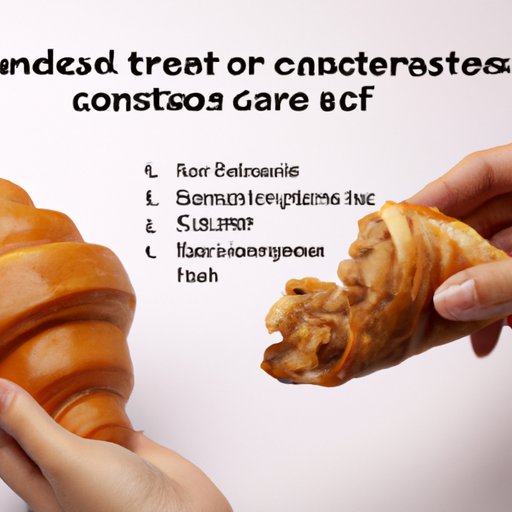Introduction
Croissants are a type of pastry made with layers of flaky dough and butter. They have become a popular breakfast food around the world, but are they healthy? In this article, we examine the nutritional value of croissants and explore their potential health benefits and risks. We also compare the macronutrient profile of croissants to other popular breakfast foods.

Exploring the Nutritional Value of Croissants
Croissants are made with white flour, butter, salt, and sometimes sugar. They are rich in macronutrients such as fat, protein, and carbohydrates. They are also a source of vitamins and minerals, including thiamine, riboflavin, niacin, iron, magnesium, and phosphorus.
The calorie content of a croissant varies depending on its size and ingredients. According to the USDA, a plain croissant weighing 42 grams contains 190 calories.

Examining the Health Benefits and Risks of Eating Croissants
Eating croissants can provide several potential health benefits. For example, the B vitamins found in croissants play an important role in energy production and brain function. Additionally, the carbohydrates in croissants can provide a quick source of energy.
However, there are some potential health risks associated with eating croissants. The high fat content of croissants can contribute to weight gain if consumed in excess. Additionally, croissants are usually made with refined grains, which have been stripped of their fiber and other important nutrients.
Comparing Croissant Nutrition to Other Popular Breakfast Foods
Let’s take a look at how the nutrition of a croissant compares to other popular breakfast foods:
Oatmeal: Oatmeal is a whole grain and a good source of fiber, protein, and vitamins. A one-cup serving of cooked oatmeal contains 166 calories, 4.2 grams of protein, 5.6 grams of fiber, and 3.6 grams of fat.
Toast: Toast is a popular breakfast food made from wheat bread. Depending on the type of bread used, it can be a good source of fiber and other nutrients. A slice of wheat toast contains 69 calories, 1.9 grams of protein, 2.4 grams of fiber, and 1.3 grams of fat.
Bagel: Bagels are another popular breakfast food. They are usually made from wheat flour, water, yeast, and salt. A plain bagel weighing 113 grams contains 289 calories, 11.2 grams of protein, 3.2 grams of fiber, and 1.2 grams of fat.
Muffin: Muffins are small cakes that are often eaten for breakfast. They are usually made with refined grains and contain added sugar. A medium-sized muffin weighing 75 grams contains 218 calories, 3.7 grams of protein, 1.2 grams of fiber, and 8.1 grams of fat.
Analyzing the Macronutrient Profile of Croissants
Croissants are relatively high in fat, carbohydrates, and calories. Here’s a closer look at the macronutrient profile of a plain croissant:
Protein Content: A plain croissant contains 4.7 grams of protein per 42-gram serving.
Carbohydrate Content: A plain croissant contains 24.5 grams of carbohydrates per 42-gram serving.
Fat Content: A plain croissant contains 10.2 grams of fat per 42-gram serving.

Investigating the Role of Croissants in a Balanced Diet
Croissants can be part of a healthy diet as long as they are consumed in moderation. The American Heart Association recommends limiting your intake of saturated fats and trans fats, which are both found in croissants. Additionally, the Dietary Guidelines for Americans recommends limiting added sugars, which are often added to croissants.
When it comes to portion size, the Academy of Nutrition and Dietetics recommends having no more than two servings of croissants per day. A serving size is typically considered to be one croissant or two slices of toast.
Here are some tips for incorporating croissants into a healthy diet:
- Choose whole grain varieties whenever possible.
- Limit added sugars and fats when preparing croissants.
- Fill croissants with nutrient-rich fillings such as nut butter, avocado, or fresh fruit.
- Pair croissants with nutrient-dense foods like eggs or yogurt.
Conclusion
In conclusion, croissants can be part of a healthy diet as long as they are consumed in moderation and paired with other nutrient-dense foods. While they are high in fat, carbohydrates, and calories, they can also provide some important vitamins and minerals. When comparing croissants to other popular breakfast foods, it is important to consider the overall nutritional value of each option.
If you are considering incorporating croissants into your diet, it is important to remember to practice portion control and choose whole grain varieties whenever possible. Additionally, pairing croissants with nutrient-dense foods can help you get the most out of your meal.
Further research is needed to better understand the health effects of croissants and how they fit into a balanced diet. In the meantime, it is important to practice moderation and make informed decisions about the types of foods you are consuming.
(Note: Is this article not meeting your expectations? Do you have knowledge or insights to share? Unlock new opportunities and expand your reach by joining our authors team. Click Registration to join us and share your expertise with our readers.)
